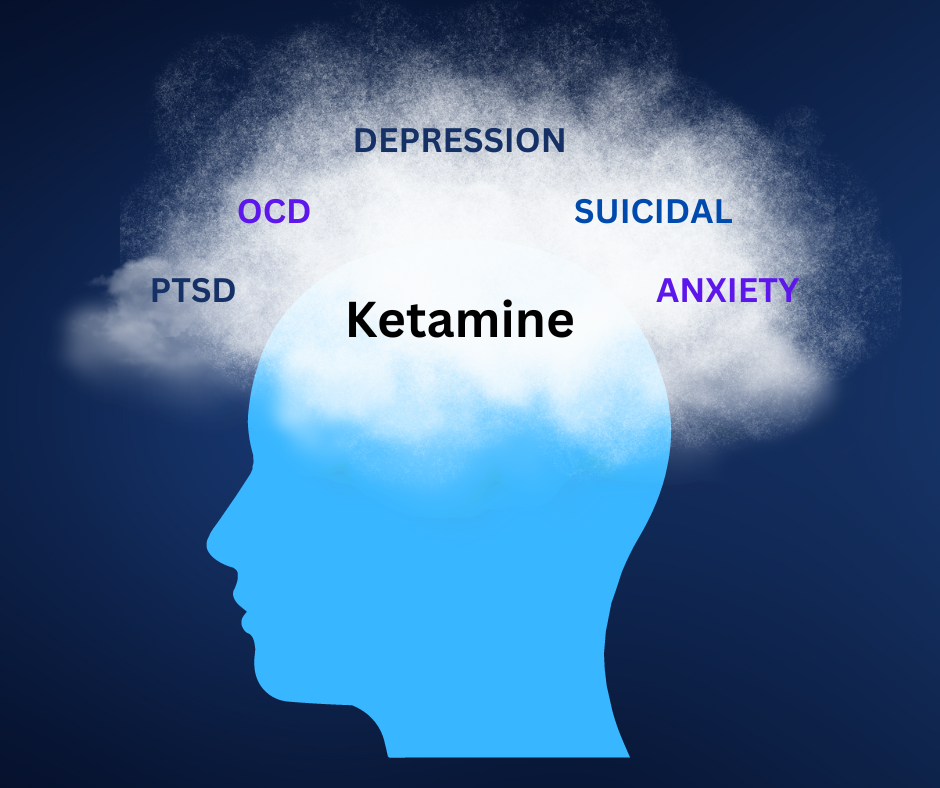As see on Psychology Today.
There are millions of Americans living with major depressive disorder. Unfortunately, many struggle with suicidal thoughts, over 1 million attempted suicide last year, and approximately 50,000 individuals took their own lives in 2023. While alternative treatments abound, one of the most promising is ketamine. However, following the death of Matthew Perry secondary to the “acute effects of ketamine,” many patients may now be concerned about its safety profile and are perhaps more curious about how ketamine works.
This post is designed to answer some basic questions about ketamine and to explain its place in psychiatry.
What Is Ketamine?
Ketamine is considered a dissociative anesthetic. It was developed by Parke-Davis in the early 1960s, patented under the name Ketalar in 1966, and approved for use in humans and animals by the Food and Drug Administration in 1970. The term “dissociative” refers to the subjective effects of ketamine. Even at low doses, ketamine can make one feel as though they are having an out-of-body experience.
What Are the Uses of Ketamine?
Ketamine has several uses. For several decades, ketamine has been a mainstay in operating rooms, where it is administered at doses of 1-2 mg/kg intravenously to provide general anesthesia while inducing sleep and memory loss. It acts rapidly and wears off relatively quickly. Most people return to feeling normal with no recollection of the surgery and limited recall of being under anesthesia.
Despite anecdotal evidence of patients experiencing improvements in mood following the administration of ketamine during surgery, as well as a study published in 1975 discovering that ketamine had antidepressant effects in animal models, investigations into ketamine’s antidepressant effects in humans did not begin until the 1990s. The first placebo-controlled, double-blinded trial involving single-dose ketamine in the treatment of major depressive disorder was published in 2000. Since then, several well-designed trials have been published demonstrating ketamine’s antidepressant effects oftentimes within 24 hours in major depressive and bipolar disorders.
In 2019, Spravato, a nasal spray containing a form of ketamine (esketamine), received FDA approval for the treatment of treatment-resistant depression for individuals who failed prior trials or are suicidal. As of now, it is the only form of ketamine approved for treatment of depression along with an oral antidepressant. Intravenous ketamine infusions are not FDA approved but remain an off-label treatment option for depression.
Is Ketamine Safe?
Yes. Ketamine has a wide therapeutic index, with an average lethal dose (LD50) of approximately 600 mg/kg in rodents (4.2 g for a 70 kg person), which is several hundred times higher than the dose needed to induce anesthesia.
Peak ketamine plasma concentrations of 1200-2400 ng/ml are required to induce dissociative anesthesia, while awakening occurs when ranges drop to 640-1100 ng/ml. When treating depression, maximal plasma concentrations typically reach approximately 185 ng/ml, though plasma concentrations of 75 ng/ml may be enough to produce an antidepressant response. For reference, toxicology reports following Perry’s death found ketamine levels were 3540 ng/ml, which is far more than one would need to induce dissociative anesthesia, and almost 20 times more than what would be observed in a typical antidepressant dose.
Despite its relative safety, ketamine is still an anesthetic. At high enough doses, it will render a person unconscious and totally unaware of their surroundings. Consequently, it is dangerous when used outside of a clinical setting. More importantly, it should never be used without supervision. Also of note, ketamine increases heart rate and blood pressure, so patients with comorbid cardiovascular disease may not be ideal candidates for treatment with ketamine.
How Does Ketamine Treat Depression?
Depression can have multiple causes, one of which is stress. According to the National Institutes of Health, “Studies in animals have shown that chronic stress also leads to the loss of communication between brain cells (neurons) in the prefrontal cortex area of the brain. The neurons lose dendritic spines, the small outgrowths on brain cells that receive signals from neighboring neurons. This leads to altered communication between brain cells.”
Ketamine appears to quickly jumpstart the process, leading to the formation of new dendrites and synapses. This structural remodeling of the brain is believed to be mediated by activity at N-methyl-D-aspartate (NMDA) receptors, which sets off a chain reaction that boosts brain-derived neurotrophic factor (BDNF) and neural plasticity in as little as two hours after administration. While it is not clear if this is the sole mechanism through which ketamine treats depression, it is currently believed to be at least one of the reasons for its efficacy.
How Does Ketamine Therapy Work?
Ketamine is not a first-line treatment. In fact, most patients who receive ketamine for depression have had treatment with four or more antidepressants, and a myriad of non-pharmacological interventions with no success.
For those who qualify for treatment with intranasal esketamine, it can be administered 2 times per week for the first 2-4 weeks, once per week for weeks 5-9, and then once every week or every other week thereafter. Esketamine is administered under the direct supervision of a healthcare provider and requires monitoring for 2 hours following administration.
A typical dose of an IV ketamine infusion is usually 0.5 mg/kg infused over 40 minutes for the initial 2-3 weeks of treatment with one-week intervals between infusions. Dosage can be gradually increased by 0.1 mg/kg to 1.0 mg/kg during subsequent sessions. Most patients receive treatment for 6 weeks but may need booster infusions depending on clinical need or may receive them periodically every few weeks or months. Improvements in mood are often immediate and may last 3-7 days initially. Repeated infusions may lead to improvements lasting for longer periods.
As is the case with all antidepressant medications, ketamine may not work for everyone. However, when administered in a clinical setting, ketamine remains a safe and potentially life-changing option for patients with treatment-resistant depression and patients who are at a high risk of suicide.
This blog was written entirely by a human with no assistance from generative AI tools.


0 Comments on "Is Ketamine Safe?"